#nina kukharchuk
Text
What Jackie Kennedy lost to Nina Khrushcheva, despite her sense of style
What Jackie Kennedy lost to Nina Khrushcheva, despite her sense of style
Jackie Kennedy and Nina Khrushcheva are often compared – not in favor of the latter. But in vain!
Nina Kukharchuk, who later married Nikita Khrushchev and became Nina Khrushcheva, is the first “first lady” of our country. The years in this status coincided with a similar position in the society of the first lady of the United States, Jacqueline Kennedy.
Women are constantly compared and most…

View On WordPress
0 notes
Photo
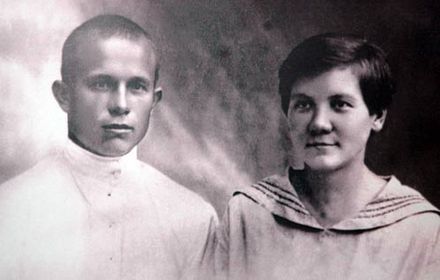
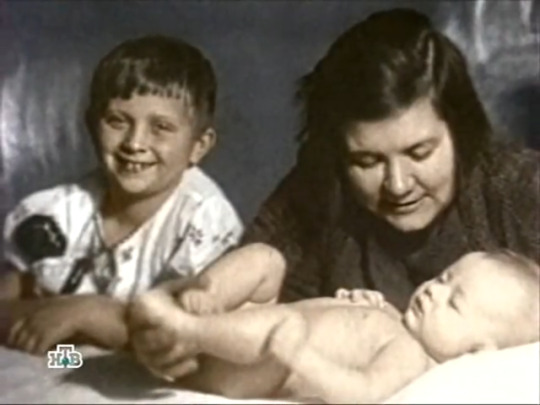
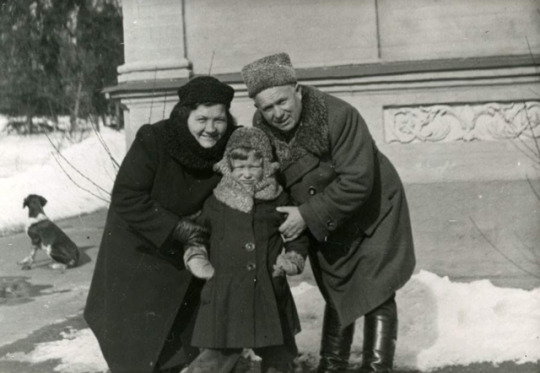
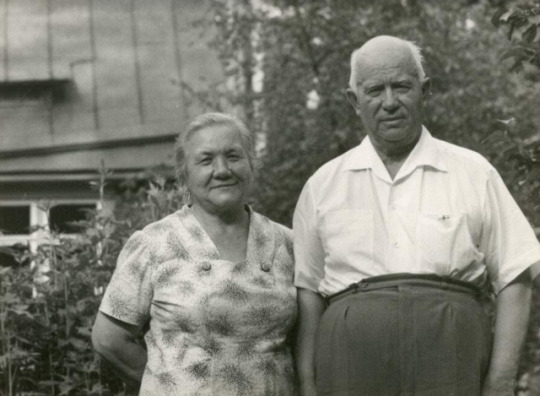
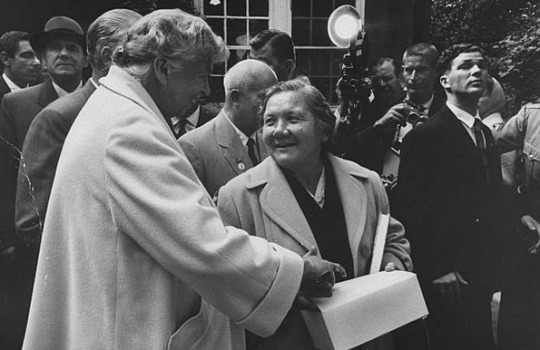
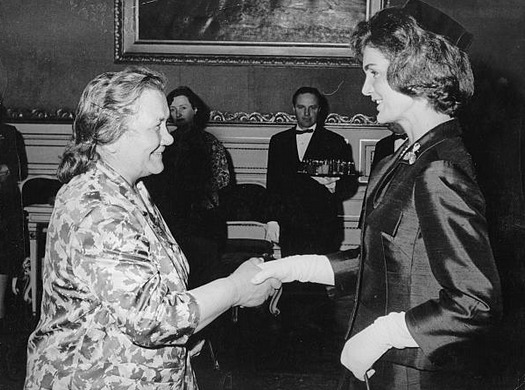
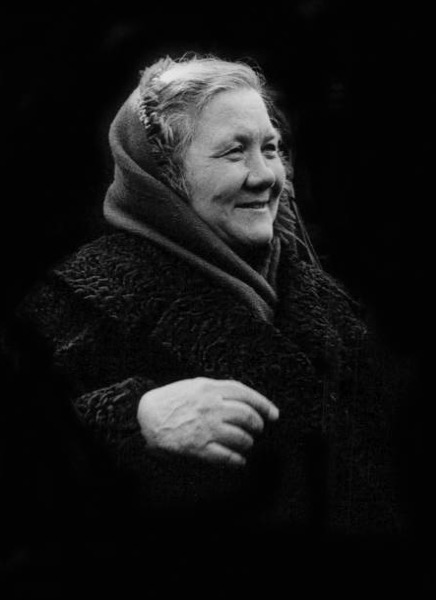
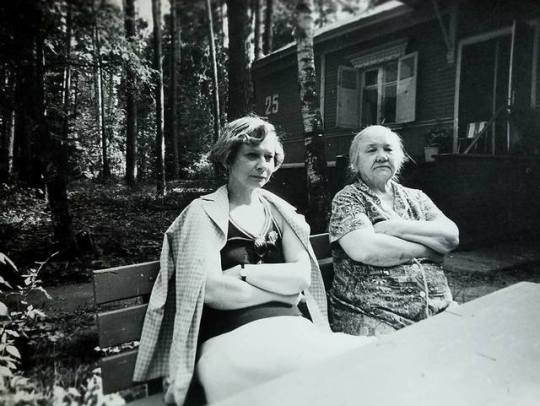
Happy 120th birthday to Nina Khrushcheva!
[Images of Nina: with her husband circa 1924; with their daughter Rada and son Sergei in 1935; with Khrushchev and their youngest child Yuliya circa 1945; with her husband in the 1960s; meeting Eleanor Roosevelt in New York and Jackie Kennedy in Vienna; in a portrait in the 1960s; with her daughter Yuliya after Khrushchev’s death circa late seventies]
Nina Petrovna Kukharchuk was born on April 14th, 1900 to a Ukrainian peasant family. She attended primary school in her village and then a girls’ boarding school in Odessa, on a scholarship funded by a local bishop. After the revolutions of 1917, she joined the Communist Party and began working in Communist organization and education.
In 1922, while teaching at a continuing education school in Donetsk, Ukraine, she met Nikita Sergeyevich Khrushchev, who was one of her students. He was a 28-year-old widower with two young children. They would spend the next forty-nine years together, although they never legally married. (In the early years of the new Soviet society, as many young people discarded religious ritual and other traditions, common-law marriages were quite widespread).
In addition to her stepchildren, Nina and her husband had four more children together, and eventually legally adopted the daughter of her stepson Leonid, who was killed in action during the Second World War. While raising her growing family, Nina at first continued working, eventually becoming head of education and propaganda for a Moscow factory. As her husband’s political career took off, though, the situation changed, and she eventually left work after the birth of her third child. During the Stalinist period, it was unusual for upper-level politicians to have working wives, in part because Stalin himself frowned on it.
As part of a family in the Soviet elite during a very chaotic period of history, Nina weathered a significant amount of stress and potential danger due to her husband’s position. For more information about the earlier period of her life, please check out this post which I made on the subject.
In 1953, Stalin died after thirty years of totalitarian rule, accompanied by a pervasive personality cult. The ensuing power struggle was crucial for the future of the Soviet Union: who would succeed Stalin, how would they interpret his legacy, and what direction would they take the country in? At this point, Nikita Khrushchev was little known outside of the Soviet Union and was not considered a serious contender by virtually anyone, including the other men in Stalin’s inner circle. Over the next few years, however, he successfully outmaneuvered his rivals. At the 20th Congress of the Communist Party of the Soviet Union in 1956, Khrushchev shocked his country and the world by openly denouncing Stalin, his personality cult, and the brutality of his regime.
This paved the way for a new era in Soviet history, one that soon acquired the colloquial name “the Khrushchev thaw”. Within the Soviet Union, this period was one of economic liberalization and greater cultural and social freedoms, pulling away from Stalinist-era repressions. While this time period was also characterized by waves of Cold War tension, there was nevertheless a serious effort by Soviet leadership to open up their country to the outside world and improve relationships with Western capitalist countries.
An important part of this effort was visits by Soviet leaders, including Khrushchev himself, to foreign countries. Nina, and often some of their grown children, accompanied him on these travels, including on a tour of America in 1959. While Khrushchev’s energetic personality and undeniable stage presence certainly contributed to the success of these visits, Nina herself was popular with the American people. She helped to humanize both her husband and the Soviet Union in the eyes of foreigners, and many American women found her particularly–and often unexpectedly–relatable.
Nina also spoke English, which allowed her to more effectively liaise with the American press and the other people she encountered on their travels, from politicians to ordinary people. She also gave a radio address directed towards the women of America on the subject of nuclear disarmament, which you can listen to here.
After a 1964 coup that removed Khrushchev from power, Nina’s life and that of her family changed again. They spent much of their time at a dacha outside of Moscow, while Leonid Brezhnev’s more conservative government undid many of Khrushchev’s reforms and tried to make him a historical pariah. In his last years, the isolated Khrushchev was often seriously depressed. Nina’s family remembered her as a strong matriarch, but her husband’s unhappiness must have weighed heavily on her. His death in 1971, however, was devastating. Letters and diary entries from the thirteen years Nina spent as a widow show a woman in deep mourning for her life partner. She was also subject to discrimination from the government, who attempted to deny her the pension she should have received as a government worker’s widow, using the excuse of nitpicking over their legal marital status. Brezhnev’s wife had to personally intervene and convince her husband to give Nina what she was owed.
To borrow the eloquent words of @strelka, Nina made a “quiet but significant positive impact on Soviet life and developing mutual understanding during the Cold War”. Personally, I find her position as a public figure interesting in part because the way she presented herself and was presented was certainly very rooted in traditional feminine roles–warmth, caregiving, compassion, being a wife and mother. Yet, at the same time, her presence resonated with many people, and she helped change the way the Soviet Union appeared to the outside world, a particularly stark contrast with the almost complete absence of women from Soviet international relations during Stalin’s time. She was also an intelligent, loving, and determined woman who lived resiliently through many transitions and traumas, both personal and national.
#sorry this post is incredibly long but a) i love history b) a friend and girl!#nina kind of reminds me of my grandmother and especially reading about how much she missed her husband after his death really touches me#kremlin wives#gonna make that a tag#my soviet history posts#nina khrushcheva#nina kukharchuk#soviet history
26 notes
·
View notes
Photo

i think about this passage in kremlin wives from when larissa interviewed rada khrushcheva on like a daily basis
#cant believe nina kukharchuk khrushcheva invented kremlin wife solidarity#fwiw i don't think anyone actually seriously considered executing nina and sergo#like maybe in 1938 but like. stalin was dead. no one left was gonna do that#but still like...fat crying cat
3 notes
·
View notes
Photo


This weekend are the birthdays of Nikita Khrushchev (born April 15th, 1894) and his wife, Nina Kukharchuk-Khrushcheva (born April 14th, 1900). They are pictured above in 1924 and below circa 1960. I’m posting this early because I’m going to be in Vladimir-Suzdal this weekend and may not have internet access, but I will be thinking of them tomorrow and Sunday, and plan to be visiting their grave sites (among others) in Novodevichy Cemetery on Tuesday.
#me looking at these pics: that’s love babey#i love how they have almost the same birthday that’s super cute#big Aries season in the Khrushchev household#also nina was so adorable i love her so much. nina kukharchuk khrushcheva i would die for you
11 notes
·
View notes
Photo

i would literally die for nina kukharchuk’s adorable face tbh
#her cute lil smile...#that's her daughter (rada) on the left and stepdaughter (yuliya) on the right#FAMILY#the khrushchevs have the cutest family pics tbh
10 notes
·
View notes
Note
related to your thesis discussion: how involved was nina kukharchuk with the party? i mean, krupskaya helped make the revolution... (i've genuinely never even heard of nina :''()
First of all, thank you so much for this extremely Up My Alley ask, I am glad to spread the good news and also infodump on my unsuspecting followers.
So, Nina was born into a Ukrainian peasant family but was able to get a good secondary education at a girls’ boarding school in Odessa because of the intervention of a bishop who noticed her as a promising student. After she graduated high school, she joined the Communist Party in 1920 and was initially posted with a Red Army regiment. After the fighting over a territory in Ukraine (which was very hotly contested) was over, the Army would occupy it and Nina would talk to the local people about communism and the opportunities that would be available to them through the new Soviet state—education, being able to feed their families better, etc. She was basically supposed to back up the Red Army with a friendly female face and get Ukrainian peasants psyched up about the USSR. Apparently she was very good at this, which I find very believable, because she came from a similar background as them, was really idealistic and passionate about her cause, and she was also young, cute, and not at all intimidating.
After the Civil War was over and Soviet power was established, Nina started teaching at a Communist Party adult-education school, educating workers and peasants about Marxist ideology and trying to transform them into good Soviet citizens and potential active members of the Party. This is where she met her husband, who was one of her students. At first, she and Khrushchev actually did quite similar work, because they were both active Communist Party organizers in Ukraine, although she also continued teaching.
In 1927, Khrushchev became the head of organization for the Kiev branch of the Communist Party, which is the point at which his career started to progress beyond hers. This is pretty typical for the period, because while women were very active in the base of the Party, more important positions were predominantly occupied by men. They also had their first child together in 1927, a little girl named Nadya, who sadly died when she was three months old. I don’t know the cause of death, but it was obviously very upsetting for them. In 1929, they had Rada, their second daughter and first surviving. They also moved to Moscow so Khrushchev could study at the Industrial Academy there. Nina continued working after having her first two children, and once they arrived in Moscow she became head of education and propaganda for a big electrical factory.
(Funny story: Nina used both her surnames interchangeably after she married—she often went by Nina Khrushcheva in terms of personal stuff or in the context of things related to her husband, but she used Nina Kukharchuk professionally. One time, someone called their apartment in Moscow and she answered with “hello, Comrade Kukharchuk speaking” and the person on the phone asked what she was doing in Comrade Khrushchev’s apartment! She had to be like “I’m his wife. This is also my apartment” hhhhh)
Back to the action. In 1935, Nina had another child, Sergei. There was a pretty big gap in between Rada and Sergei, which I’m assuming was intentional because they were getting established in Moscow and both of them were very busy with work. After Sergei was born, Nina stopped working. There are a variety of reasons for this, both personal and political. First of all, she seems to have felt like she missed out on a lot of Rada’s baby years because she was so busy and didn’t want to do that with future children. Secondly, 1935 was also the year her husband became first secretary of the Moscow Communist Party, so Nina was now the wife of someone who was quite important and had attracted Stalin’s attention. In the upper echelons of the Party hierarchy, there seems to have been more pressure for women to stay home, partially because their families were privileged enough that they didn’t have to, and partially because Stalin was threatened by assertive, independent women and expressed disapproval. Aside from external pressure, as Khrushchev became more important, they seem to have decided (and I do think this was a joint decision, rather than him pushing her) that he needed more constant emotional support and advice from his wife.
While there were definitely some sexist attitudes at play here (men have the important career, women take charge at home), I don’t think it would be fair to condemn him too harshly for this, because you have to consider the context. Ordinarily, if some guy was all “because of my important political career, I need my wife to take care of me”, I’d roll my eyes and talk about men expecting emotional labor from their female partners and wanting to have their hands held. But in the case of someone whose important political career was situated in the Soviet Union during the Stalin era, I’m inclined to acknowledge that he genuinely needed a lot of emotional support.
Being high-ranking in Stalin’s government brought a lot of power and a lot of privilege, but it also brought an incredibly stressful day-to-day working environment with lots of petty infighting, and, more importantly, a significant and very real threat of eventual execution. This was a very dangerous world they were getting into, and it could be very isolating. A lot of Kremlin families of the era seemed to…regress into the home, sort of, and their immediate family became very important because sometimes it probably felt like they couldn’t trust anyone else. The Khrushchev family wasn’t as vocal about the effects of being part of Stalin’s inner circle, but to give some idea of the situation, I’m going to draw from the Mikoyans.
Anastas Mikoyan, obviously, was a close friend and staunch ally of Khrushchev. He had been close to Stalin longer, since the early 1920s, but by the time the purges started he also had cause to worry. He and his wife, Ashken, had discussed what they would do in the event suspicion fell on him, and he had decided that he would shoot himself rather than be arrested and charged as an enemy of the state, because he would inevitably be executed anyway and he thought things would be better for his wife and children if he killed himself before that could happen. Thankfully, it never came to this, but living with that fear must have been excruciating. Ashken Mikoyan used to wait up for her husband every night, sometimes until four or five in the morning if he’d been up late meeting with Stalin, so she could be reassured that he was okay and so she could be there for him when he got home. Ashken apparently felt like the most important thing she could do for her husband and her family was provide a safe, emotionally supportive place for him to come home to. I wouldn’t be surprised if Nina felt the same way. Like Ashken, she was probably extremely aware of the danger her husband was in, as well as the fact that often wives and children would be imprisoned or even executed as well if the head of the family was purged. Both Nina and Nikita seem to have made a lot of effort to protect their children from this fear—both Rada and Sergei remember that their parents never discussed politics or their father’s work in front of them.
In this environment, I can see why staying home would be more appealing than it might have been earlier in Nina’s life. While she clearly loved her work and found it fulfilling, it was also time-consuming and stressful, and as she had more children to take care of and her family had to live under a more or less constant threat of violence, it makes sense she apparently felt like her work had to go.
Sorry, this turned into more about the complicated and horrifying family dynamics and mentality of the Communist elite under Stalin and less about Nina’s work with the Party, but she did have a very active career for 15 years, which she then chose to leave for reasons I think are very understandable. I do think it’s kind of sad, though, that in her early years she dedicated so much of her time and energy and spirit to the Party and the state and then she had to leave that behind in part because of this climate of fear that had completely overtaken the Party and the state because of Stalin.
This doesn’t even get into Nina’s position once Khrushchev became premier/general secretary, partially because I’m still learning about that period and partially because this is already long as hell. In summary, she took on a much more public role than she had in the previous period, but it was different to when she’d been so actively involved in political organization in her early career when she and her husband had both been starting out.
#OBNOXIOUS HISTORY NERD ON MAIN IM SORRY#this is mostly drawn from kremlin wives but also the taubman bio of khrushchev but also various mikoyan sources#my soviet history posts
31 notes
·
View notes